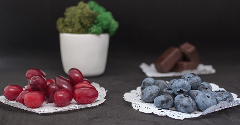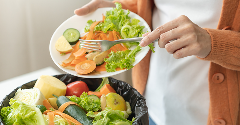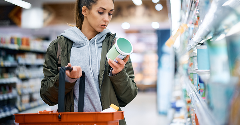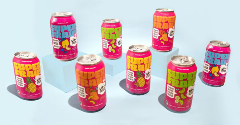Quest for anti-ageing ingredients boosts collagen demand
13 Jan 2020Collagen is the most abundant protein in the human body, but production slows down with ageing, leading to weaker joints and skin wrinkles – and increased demand for collagen as an ingredient in food, drinks and supplements.
The body makes collagen by breaking down proteins from food into amino acids, and the process also requires nutrients like zinc, copper and vitamin C. However, the body tends to become less efficient at absorbing and synthesising nutrients as we age, meaning it produces less collagen. Increasingly, consumers are turning to a wide range of collagen-based ingredients in the hope that they will boost collagen directly.

According to a report by Grand View Research, the global collagen market could reach $6.6 billion by 2025 with a CAGR of 6.5%. And in the past couple of years, collagen ingredients have started appearing in numerous foods and drinks, including teas, protein bars, smoothies, and even in popcorn.
Collagen entered the US beauty market as an injectable filler for lips and wrinkles in the 1980s but has since shifted into nutritional and topical products, mainly to promote skin elasticity. The beauty category still dominates, including for ingestible products (food, drinks and supplements), but other categories are coming to the fore. Collagen has become particularly popular in the sports nutrition market, for instance, with companies like Rousselot offering collagen ingredients claiming specific benefits linked to muscles, recovery and connective tissue support.
In Asia, improving and retaining mobility has been a popular market segment for collagen products for years, and the link between age-related bone and joint health and collagen has started to take off in western markets too. Gelita, for example, claims that its collagen ingredients could help strengthen joints and prevent injury, boost bone density and prevent sarcopenia.
For consumers, there is a certain logic to the idea that consuming collagen-rich products will boost collagen quality and quantity, but there is little evidence to suggest that collagen is broken down by the digestive system in a way that is different from any other protein. Some researchers suggest that when collagen protein is broken down into peptides, they are able to connect to certain cell receptors depending on their length. This might mean that different peptides could stimulate different kinds of collagen production, such as in the joints, bones or skin. However, this theory remains far from proven.
Suppliers say part of collagen’s appeal for manufacturers is that it is easy to work with. It can be formulated into a wide range of products, including chocolate, soup, supplements, powders, drinks and more. It is also relatively inexpensive as a protein source.
Of course, collagen is sourced from animals, so it is not suitable for vegetarians, but Euromonitor International has suggested that there is an emerging opportunity for plant-based products that claim to boost collagen production without the use of collagen itself as an ingredient. Lycored, for example, offers a tomato-based antioxidant ingredient that it claims can maintain natural collagen levels in the skin to help prevent wrinkles.
Marine-sourced collagen peptides are on the rise too, as manufacturers look to make halal and kosher claims.
Apart from its uses as a functional ingredient, collagen is also useful for its water-binding properties, meaning it helps retain moisture in meat products like sausages, and can be used as an edible coating or a carrier for nutritional ingredients.
Related news

Plastic packaging reduction requires industry rethink
6 Jan 2023
The food and beverage sector is calling for industry-wide collaboration and business model updates to reduce the environmental impact of plastic packaging.
Read more
Misleading nutrition claims mask true sugar levels in baby food
5 Jan 2023
Some baby and toddler food and drink products, sweetened with fruit concentrate, contain up to four teaspoons of sugar per serving yet are marketed as having ‘no added sugar’, according to a survey by Action on Sugar.
Read more
Asian beverage brands deal with rising costs
4 Jan 2023
Decreasing bottle sizes or increasing prices? Asian beverage brands are finding “creative approaches” to manage rising costs, according to industry analysts.
Read more
Preserving the freshness of food to fight waste
3 Jan 2023
Several companies are producing products that absorb ethylene, the hormone that causes food to ripen, in attempt to reduce food waste.
Read more
Value-seeking US consumers cut back on food spending
2 Jan 2023
Cheaper items, smaller sizes, and shorter grocery lists: inflationary effects coupled with a global long-term recession are set to continue shaping food spending habits, according to a recent Rabobank report.
Read more
Opportunities grow for lower-caffeine coffee
23 Dec 2022
Many consumers want the mental focus of caffeine without the jitters, prompting a wave of product development such as “half caffeine” ground coffee or ready-to-drink (RTD) cold brew blended with relaxing botanicals.
Read more
Superfrau upcycles liquid whey for energy drinks
22 Dec 2022
US company Superfrau turns surplus whey into sustainable, upcycled-certified dairy products for the recovery drinks market.
Read more
Malaysian brand Nanka brings jackfruit range to Europe
21 Dec 2022
Malaysian brand Nanka is expanding to new Asian and European markets with its fast and ready-to-eat plant-based products based on jackfruit.
Read more
Is the UK on target to meet its 2025 Plastics Pact?
20 Dec 2022
Major food industry players, including Arla, Kerry, PepsiCo and TerraCycle, have signed the UK’s voluntary Plastic Pact to reduce plastic from the supply chain – but are they on track to meet their targets?
Read more
Chinese food brand wants to give customers ‘the full experience’
16 Dec 2022
Food brand Xiao Chi Jie is revamping Chinese cuisine for the modern American consumer. The Washington-based company sells regional Chinese specialties like soup dumplings, noodle kits, and barbeque skewers direct-to-consumer in the US.
Read more